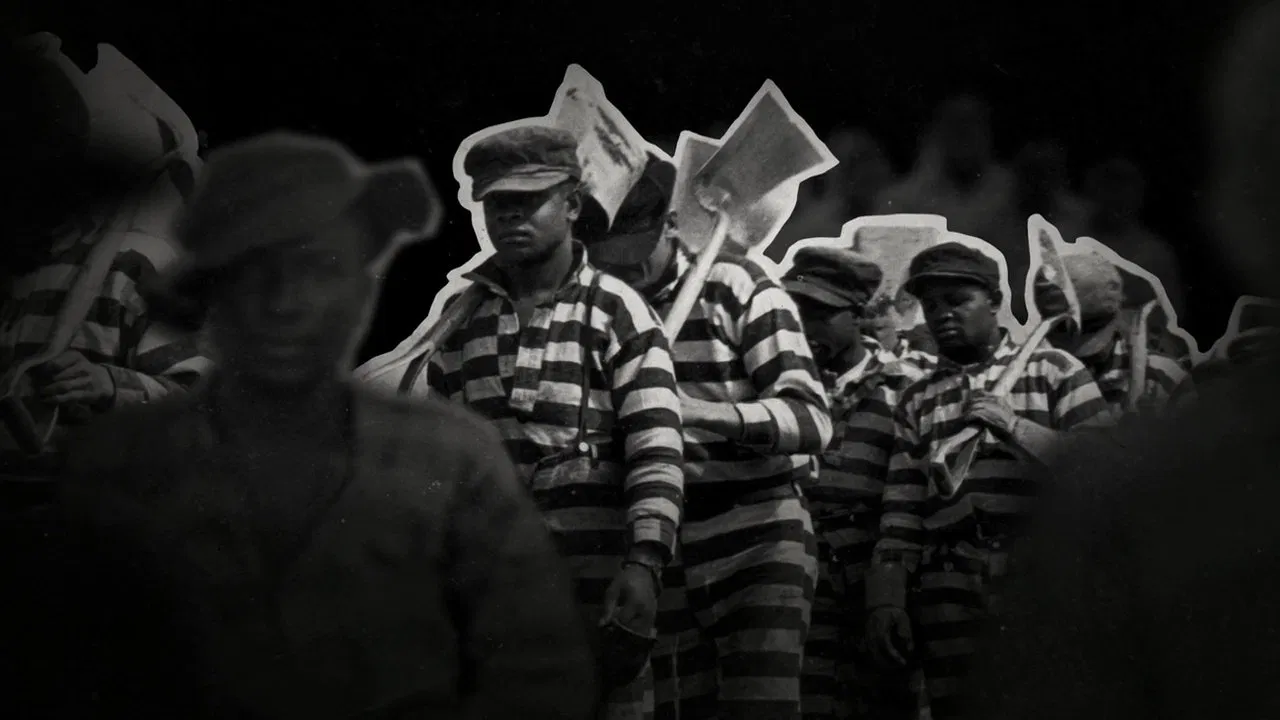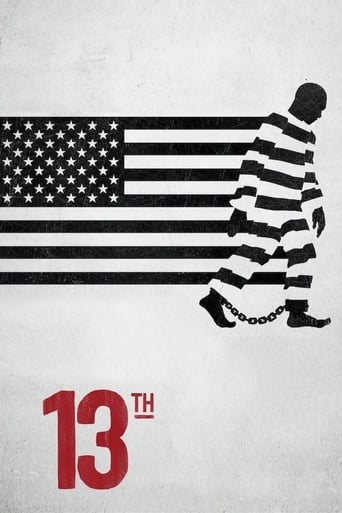ManiakJiggy
This is How Movies Should Be Made
Exoticalot
People are voting emotionally.
MamaGravity
good back-story, and good acting
PiraBit
if their story seems completely bonkers, almost like a feverish work of fiction, you ain't heard nothing yet.
Jackson Booth-Millard
I try every year to watch as many, if not all, films nominated during Awards Season, especially the Oscar nominated movies, this documentary was one I had heard about, so I watched it when it was available on Netflix, directed by Ava DuVernay (Selma). The title is in reference to the 13th Amendment in the United States Constitution, this was responsible for the abolition of slavery and involuntary servitude, except as punishment for a crime. Basically the film focuses the criminal justice system in America, specifically the "intersection of race, justice and mass incarceration in the United States". It also explores the fact that a majority of prisoners held in the various prisons around the States are African American, many of them have convicted for one crime that is perhaps not as serious as others, e.g. possession of drugs, vagrancy, and that the number of prisoners increases every decade. It also delves into how racism has played significant roles in history, in films (like The Birth of a Nation and 12 Years a Slave), and in the political climate, including the creation of the KKK (Ku Klux Klan), Martin Luther King and Malcolm X fighting for Civil Rights, and Barack Obama becoming the first black man to become President of the United States. Over the years, many have tried to combat race related issues in various ways, even Presidents have made statements about combatting the "war on drugs", a subtext for racial issues. It is a fact that the United States is 5% of the world's population, but it has 25% of the world's prisoners. Using archive clips, and interviews from politicians, activists, academics and former presidents, it really makes you realise that the treatment of black people is perhaps still being tackles, with protesting, militarisation of law enforcement, and police shootings becoming key issues. It does have disturbing images from the past, including about slavery, the original perceptions of black people, segregation (with "coloured" bathrooms) and other injustices, and the rules of imprisonment are harsh. Recently featured in the book 1001 Movies You Must See Before You Die, I can see why this is an important film, it really delivers its message that there are still changes to be made in America, especially when it comes to laws and racial equality, it is a shocking, fascinating and insightful documentary. It was nominated the Oscar for Best Documentary Feature. Very good!
JR Rushik
In this eye opening documentary, the prison system is exposed as modern day slavery. The basis for this conclusion is a single line from the 13th amendment, "Neither slavery nor involuntary servitude, except as a punishment for crime...". Did you catch that? Slavery was made illegal, except as a punishment. In other words, the 13th amendment introduced a new form of slavery, the prison system. In regard to the films bias. The producer tries to remain balanced and nonpartisan, but it is clear that the there is a specific agenda at work. The first half of the film has a fairly balanced representation of both democrats and republicans as part of the problem, but the in the final 45 minutes the scales are woefully tipped to only spotlight liberal perspectives. This is the worst aspect of the film and the reason my review is not higher. I found that the heart of the film is not in a broken justice system, but instead in the value of people. Prisoners are people. Each has a story. The escalating number of prisoners has torn families apart and removed opportunity from otherwise productive members of our society. I am in favor of consequences for wrong actions, however the film highlights that there is a great deal of injustice in the system that results in unnecessary and overwhelming consequences. In a society that is built on treating people equally, the prison system with it's billion dollar economic system, often tramples on those values. Herein lies the tension. How do we honor and value all people and hold people accountable for their wrong actions? A prevailing value in our culture is that all people deserve fair and equal treatment. This is found throughout our justice system, but was born our of the Bible's text, "For God does not show favoritism." (Rom. 2:11; Acts 10:34), et al. The people in prison are fellow human beings that deserve dignity and respect. They also need someone to be their voice to stand up for the injustice in they system. Not just for them but also for their children and grandchildren. The voice of this film is a clarion call for justice reform on behalf of this generation and the next. I give my highest recommendation for this important work.
pbpbspex
The United States did not just criminalize a select group of black people. It criminalized black people as a whole, a process that, in addition to destroying untold lives, effectively transferred the guilt for slavery from the people who perpetuated it to the very people who suffered through it.
fkdagain
Fair warning: I am aware my review will be downvoted into oblivion like everyone else who recognized the film is a propaganda piece. If you're willing to recognize an alternate (but factual) viewpoint, carry on.This film had potential to be great, if it wasn't biased. For example, around 46 minutes, Assata Shakur is brought up, being called a revolutionary hero. However, the film intentionally left out why she was serving a lifetime prison sentence, so I looked it up. She was a gang member and a cop killer, and the entire Black Lives Matter movement (literally a terrorist group by definition) is based on her. In fact, her alternate name is being used in the film so you don't immediately recognize this (if you previously knew about her).But if this was included in the film, the argument would've fallen apart immediately. The film tried to use her as an example of the FBI going after a powerful black figurehead, such as with MLK. You cannot compare those two individuals simply because they're both black and both were wanted by the FBI. They were completely different people.Beyond that example, which is just one of many instances of the purposeful omission of key information, the film simply grabs at straws. The concept is based on the oppression and "slavery" of African Americans beyond the Civil Right Movement. Yes, obviously this did happen, and the film did present some significant examples, such as presidents and elite politicians subtly having racist motives.Where this film fails is by not addressing significant philosophical and sociological questions. It does not discuss how, because African Americans were oppressed and many lived in cities, they could not find work or they lived in poverty. And what happens when you live in poverty, regardless of race or ethnicity? You're more inclined to turn to drugs and crime. So there's a reason to be arrested. In fact, while the film tries to say black people were specifically hurt by certain laws, those laws hurt everyone, regardless of race or ethnicity.The film doesn't discuss how the black race is, unfortunately, largely represented by an urban subculture which glorifies crime and violence as a progressive result of poverty. The film would've been better if it introduced this, because then the interesting argument of a cycle is created:Black oppression > stereotypes > poverty > excessive drugs, violence, and crime > tougher laws > longer prison sentences > further emphasis on stereotypes and racismThe film completely blows over this, and instead basically says, "Black people did nothing wrong! It's all the white man's fault, trying to make us slaves again!" In the last three decades, there have been many, many important African American members of society who made something of themselves, fought their way out of economic hardship, and so on. How about Jimi Hendrix, Neil Tyson, Oprah, Michael Jackson, Morgan Freeman, Denzel Washington, the former president, etc. What do they have in common? They weren't involved in that glorified subculture. In addition, the film is intended to be a combination of both black oppression and the insane incarceration rate in the USA, but it would've been better off not trying to say, "It's the white man's fault!" Discussing the prison-for-profit system and unfair poverty in the USA we have without incorporating a falsified perspective of racism would've been better.What you'll get here is a ridiculous argument about how the modern-day prison system is exactly like the post-slavery prison system, in which slaves were arrested for petty crimes to work for free again and rebuild the economy. The modern era is nothing like that, and does not unfairly affect blacks. It affects criminals.

